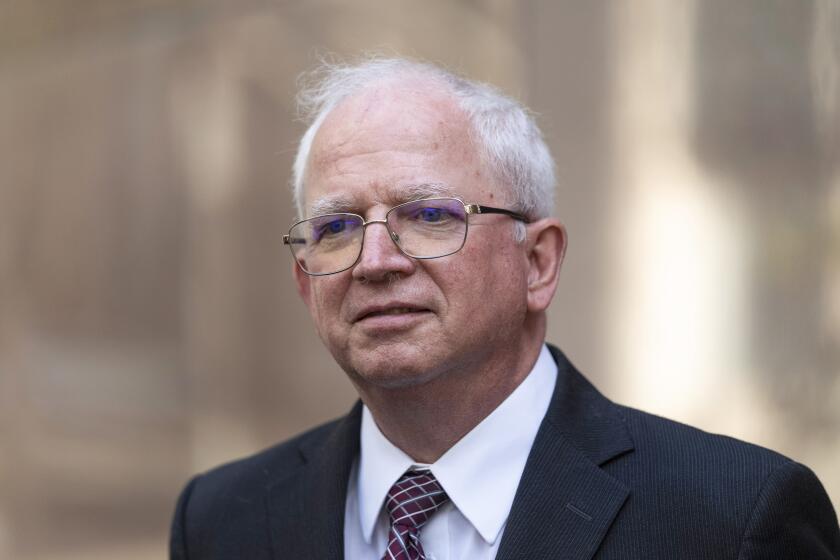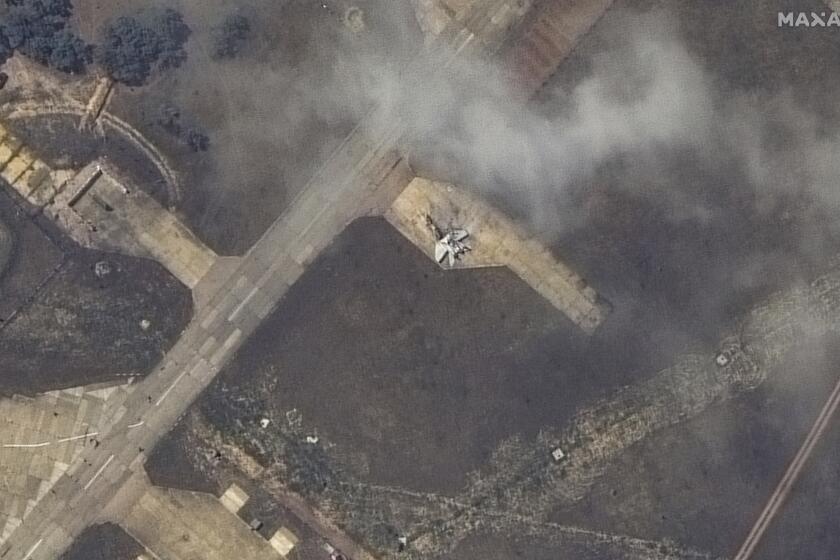Israel, PLO Agree to May 4 Signing : Mideast: Two sides resolve key issues in breakthrough brokered in Cairo by Christopher and Egypt’s Mubarak. Rabin and Arafat will hammer out the final details.
In a breakthrough brokered Thursday by Egyptian President Hosni Mubarak and Secretary of State Warren Christopher, Israel and the Palestine Liberation Organization resolved several key disputes and committed themselves to formally sign a long-delayed agreement next Wednesday to begin Palestinian autonomy in the Gaza Strip and Jericho.
The announcement of the new target date and the pledge to resolve all but two major, remaining issues between the PLO and Israel came after daylong meetings and intensive diplomacy in Cairo. The participants included PLO Chairman Yasser Arafat, Israeli Foreign Minister Shimon Peres, Christopher and Mubarak.
For the record:
12:00 a.m. April 30, 1994 For the Record
Los Angeles Times Saturday April 30, 1994 Home Edition Part A Page 4 Column 3 National Desk 1 inches; 30 words Type of Material: Correction
Bus bombings--A story in Friday’s Times misstated the location of two recent fatal bus bombings, apparent reprisals for the massacre of about 30 Palestinians in a Hebron mosque. The bus bombings occurred in Israel.
Christopher, who said he will extend his visit to the region to attend next week’s scheduled signing ceremony in Cairo, declared Thursday’s announcement a critical step that adds momentum to the struggling Middle East peace process.
The four leaders, appearing side-by-side at a news conference at Mubarak’s presidential palace, indicated that the outstanding disputes are contentious; senior U.S. officials said the parties yet might not meet next week’s target date.
The two sides--riven by violent incidents such as the recent, fatal bus bombings in the Israeli-occupied territories and the February massacre of about 30 Palestinians by a U.S-born Israeli settler at a mosque in Hebron--have missed several key deadlines before in their current negotiations.
But Arafat, Peres and those same U.S. officials made it clear that Thursday’s announcement represented a major step toward ending the tedious negotiations to implement the Israeli-PLO self-rule declaration, signed last Sept. 13 in a historic, largely symbolic ceremony on the White House lawn.
“For us, it is the end of a long voyage and the beginning of a new chapter in the relations between the Palestinian people and ourselves, adding another footstep to the peace in the Middle East,” declared Peres, who will stay in Cairo through today in an effort to complete a final draft of the agreement.
A senior U.S. official with Christopher, who left Cairo on Thursday night for a two-day visit to Israel, also sounded nearly euphoric in assessing what one called “an extraordinarily complex set of discussions” throughout the day.
“We have every expectation that the differences will be resolved,” the official said. “The parties appear fully committed to this timetable.”
Arafat and Peres made it clear that their negotiating teams, which have spent weeks locked in often fruitless debate here, would toil through the night and possibly into the weekend to complete a draft of the final autonomy plan.
That document, Mubarak announced, will be made final in a summit scheduled to begin here Tuesday between Arafat and Israeli Prime Minister Yitzhak Rabin, who will resolve the last details before Wednesday’s signing ceremony.
Despite Thursday’s euphoric handshakes and the effusive optimism by the four leaders, Arafat and Rabin have already agreed that they will personally negotiate two of the most contentious issues face-to-face when they meet next week: They must resolve the size of the Palestinian enclave in Jericho and the presence of Palestinian police on the Allenby Bridge, which connects Jericho to Jordan.
Negotiators for both sides said they will tackle smaller disputes in the closed sessions in a luxury hotel here before the start of the Arafat-Rabin summit. At the heart of those disputes is the extent of Palestinian autonomy in a new entity that Israel insists will not be a separate state.
Palestinian negotiators, for example, have insisted on the right to issue Palestinian passports, postage stamps and their own telephone country and area codes for residents of Gaza and Jericho.
The two sides also have yet to settle details of police and judicial jurisdiction in the new Palestinian enclaves.
The four leaders insisted the sides are close on all these matters, which Mubarak several times sought to cast as “minor issues.”
“We concluded and we resolved so many of these points, until just some small issues--maybe a little difficult--(remain),” he said. “But they’re going to be discussed and concluded in the coming one or two days.”
Beyond discussing their new deadline, the leaders declined to provide details of the day’s agreements.
Senior Christopher aides later indicated that the breakthrough was more in form than in substance--a commitment from both sides to a framework that they agreed would resolve the major disputes quickly.
As evidence of the impact of Thursday’s agreements, the PLO’s chief negotiator, Nabil Shaath, told reporters as he returned to the table Thursday night, “Maximum by tomorrow, we will finish up.”
For Christopher, whose aides characterized his role as that of “a catalyst,” the most significant matter Thursday was the attitude expressed in his meetings, first with Arafat, then Peres, then Mubarak and finally in a 75-minute group session.
“What I found to be so impressive was the sense of urgency that both sides now have about reaching a conclusion of this implementation agreement,” he said.
Aides said Christopher called his Russian counterpart, Foreign Minister Andrei V. Kozyrev, after the meetings to invite him to attend next week’s ceremony. Russia and the United States have co-sponsored the peace process that began in Madrid 2 1/2 years ago.
Christopher clearly hopes to find a similar urgency in Jerusalem today to move that process ahead on other fronts, as well. He is scheduled to meet with Rabin to discuss proposals to restart Israel’s talks with Syria, where Christopher is to go on Saturday.
In a news conference Thursday in Cairo, Israel’s foreign minister said he could not confirm Israeli press reports of a detailed proposal to return the Israeli-occupied Golan Heights to Syria in a phased, 10-year plan that would include several thousand U.S. peacekeepers stationed on the strategic heights overlooking northern Israel.
But Peres repeated the Israeli government commitment to entertain any proposals or concessions to achieve a permanent peace accord and full, open relations with Syria in return.
When asked what could accelerate a peace between Israel and Syria, Christopher pointed to Thursday’s agreements in Cairo--particularly the new deadline.
“That, in itself, creates a very important sense of momentum,” he said.
And for the 1 million or so Palestinians who have lived a roller coaster of frustrated expectations and missed deadlines since last September, Christopher likened their situation to the change occurring in South Africa.
“I do want to stress that the time has come, I believe, to conclude this phase and move on to implementation,” he said. “There is an opportunity for the people of Gaza and Jericho to experience for the first time an opportunity to manage their own lives, somewhat comparable to the thrilling experience that we are seeing today in South Africa.”
More to Read
Start your day right
Sign up for Essential California for news, features and recommendations from the L.A. Times and beyond in your inbox six days a week.
You may occasionally receive promotional content from the Los Angeles Times.






